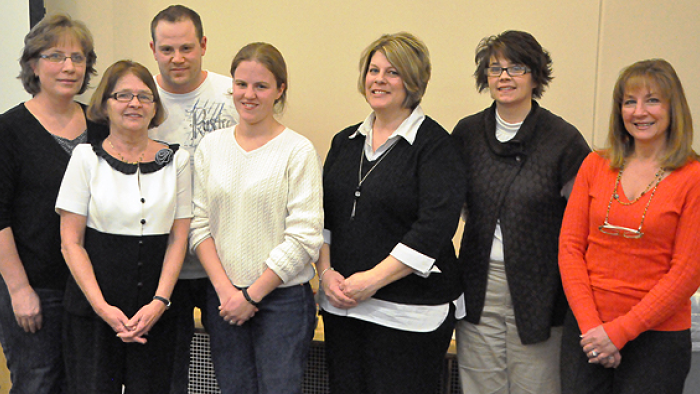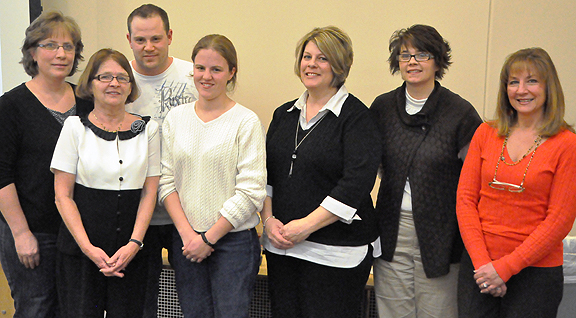
At a glance
 The Alfred State Nursing Department continued its “Pay It Forward” philosophy through the awarding of its sixth annual round of “Pay It Forward” scholarships, established during the fall 2006 semester and presented to this year’s recipients, Marlene Cocchetto, Arkport; Douglas Elliott, Arcade, and Meghan Walters, Branchport, who each received $150 and good wishes from the class of 2006.
The Alfred State Nursing Department continued its “Pay It Forward” philosophy through the awarding of its sixth annual round of “Pay It Forward” scholarships, established during the fall 2006 semester and presented to this year’s recipients, Marlene Cocchetto, Arkport; Douglas Elliott, Arcade, and Meghan Walters, Branchport, who each received $150 and good wishes from the class of 2006.

The Alfred State Physical & Health Sciences.
Burdett: As I read about the nursing students’ “Pay It Forward” gestures each year, the depth of their compassion never ceases to amaze me. The Alfred State nursing graduates have developed a culture of their own since the inception of this concept.
Shepard: To me, our profession is all about paying it forward, as nurses we put the needs of others above our own. These students went above and beyond to provide something someone else needed; these acts were not required or expected. A simple gesture can change the lives of many. To me “Pay It Forward” is synonymous with the care nurses give.
Dunn: I found this year’s submissions to be quite moving. Caring is an integral part of the nursing profession. This year’s recipients have demonstrated the importance of “Paying it Forward,” and have made a difference for families they reached out to.
Cocchetto’s project read, in part: “The Oxford Dictionary definition of caring, ‘displaying kindness and concern for others,’ uses two very powerful words: kindness and concern. Whether we are speaking to someone or performing a ‘pay it forward’ act, we must remember to do it with kindness. A simple smile or kind gesture conveys to the recipient that you truly do care and that you’ve put their needs ahead of your own.
“The second word, concern, is the driving force in the act of caring. We not only anticipate someone’s needs, but we convey concern and empathy. That’s what really makes a difference to the people we help. Our acts don’t have to be big deals; I think it can mean more to people when someone does a small act of kindness. In fact, Mother Teresa said, ‘Do small things with great love.’ To me, that is the greatest definition of the word ‘caring.’
“When I read about this caring project, I knew I wanted to arrange a Thanksgiving meal for a patient in Rochester who is homebound and estranged from her family. She is very ill and has not been out of her bed in over five years. My husband, who is also ill with the same bone marrow infection, speaks to ‘Cindy’ occasionally and he knew that she would have no other means to a special meal. I phoned her several days before and offered to provide her Thanksgiving dinner. She was extremely moved and very thankful.
“I was excited as I shopped for this wonderful meal! I kept buying things such as special breads, candies, and treats; my husband, caught up in the excitement, made certain that she not only had food but a card and some early Christmas decorations as well. I ran the menu by her to be sure there weren’t any special nutritional needs to consider. The night before, I was up late baking pies and preparing the cranberry mold. I got up very early on Thursday to put in the turkey. Cooking complete, we packed the truck and headed out. Words cannot describe my joy as she opened the coolers and bags. She choked up and could barely speak as she looked at the feast we brought. Every day is a struggle for Cindy, but the holidays must be especially difficult. Her family isn’t around much and she spends every day alone in that house. It was for those reasons that I enjoyed this caring project. It allowed me to make a difference in her life – even if it was for just one day.”
Elliott’s project read, in part: “Caring- feeling and exhibiting concern and empathy for others.
“Caring is an integral part of the nursing profession because in order to truly provide for a person’s needs, physical and psychological, you must empathize with them. If patients feel that you care for them, the patient/nurse relationship of trust becomes that much stronger. The foundation that is built on trust can then become the foundation for the patient’s healing process to begin.
“As a patient care technician (PCT) on a physical rehabilitation floor, I experience a wide variety of pay it forward opportunities. Most of my patients have led ‘normal’ lives until a disability occurs suddenly and is, sometimes, permanent. One particular patient, a 45-year-old female stroke victim, needed to use a walker. The last step in her rehab was to conquer going up and down stairs. With hard work she managed to do this, utilizing the practice set of steps in the facility. While ambulating down the hall one afternoon, she mentioned to me that she was finally able to move up and down the steps freely, but her back steps at her home were too wide. She was going to need a railing in the middle of them in order to get into her house. She said while her son was visiting from Michigan, he had bought some supplies to accomplish this, but had been unable to do it because he had to get back to his family. She asked me if I knew anyone willing to do this. She even added, ‘I’ll pay.’ I asked her if I could go to her house to have a look at them. I knew right away that I was going to do the job. After work that day I drove to her home. Her daughter let me into the garage to have access to equipment and tools. Before long, the railing was in place. Although her daughter offered to pay, I told her that I was doing this because I wanted to, not because I wanted anything in return. I never saw the patient before she was discharged, and I don’t know what her reaction to the railing was. I came to realize on the way home that day that for just about one hour of my time, I changed the life of one person, maybe more, for a very long time. I had a feeling of accomplishment. I believe even if people are not actively thinking about paying it forward, they seem to do it because you have engraved it into them by doing something nice for them. At least, that’s how it works for me. Even when somebody smiles at me, I want to pay that smile forward. I do this because of the satisfaction it gives me but also because I would hope that someone would do something nice for my mother, wife, or daughter, if I wasn’t able to help them.”
Walters’ project read, in part: “Caring is the feeling or exhibition of empathy and compassion toward someone or something.
“I believe that caring is an integral part of the nursing profession because to be good at your job, you have to care about and for your patients. It is important to care about, not only the clients, but also for the loved ones that may be involved. To best advocate for the client, nurses may have to go out of their way and this would entail that the nurses genuinely care about the client and their situation.
“For my caring project I mailed a card to a person that I had never met.
[One day] “my cell phone rang and displayed a number I did not recognize. Normally I would let my voicemail pick up, but on this day I decided to answer it. On the other end of the line was the feeble voice of an older woman that asked ‘Is Ricky there?’ Approximately six months before I had gotten a similar phone call asking for the same person, so instead of simply saying, ‘no, wrong number,’ I thought that maybe I could help this repeat ‘misdialer.’
“I said to her, ‘I think you’ve called me before looking for Ricky, but this is my cell phone number. Maybe Ricky had this phone number before I did. What number did you dial?’ The woman on the other end rattled off my number and I responded with ‘maybe Ricky has a different number now.’ She thanked me for being so kind and told me that she had dialed the number from memory as she was bedridden and she didn’t want to disturb her husband who was taking a well-deserved nap. She said that they were both in their 80’s and had been married for 67 years. The conversation lasted about 20 minutes. Upon ending the conversation she thanked me quite extensively and told me how nice it was to hear the voice of ‘another lady.’
“Following this conversation, I took the number from my cell phone and used it to find the address where the call had originated. I then got a card and mailed it with a little note referring to how much of an inspiration 67 years of marriage was to a young wife and mother like myself in a day and age when divorce is so prevalent. I also told her in the note that even though Ricky was not at the number any longer, if she ever wanted just to have a chat, I was there. About a week after mailing the card, I got a return phone call from Mrs. Mary. It is amazing that it is possible to start a friendship with a simple wrong number.
This act of caring made me feel absolutely wonderful. I sincerely believe that this kind lady was indeed in need of a friend and hopefully I filled that need. I also hope that she was able to feel “cared for” even if it was by a stranger she had never met who lived far away.

L to R: Marlene Cocchetto, Professor Panter, Douglas Elliott, Meghan Walters, Laurie Dunn, Timberly Shepherd, Annette Burdett. Dunn, Shepard, and Burdett were the chosen readers of the caring papers.
